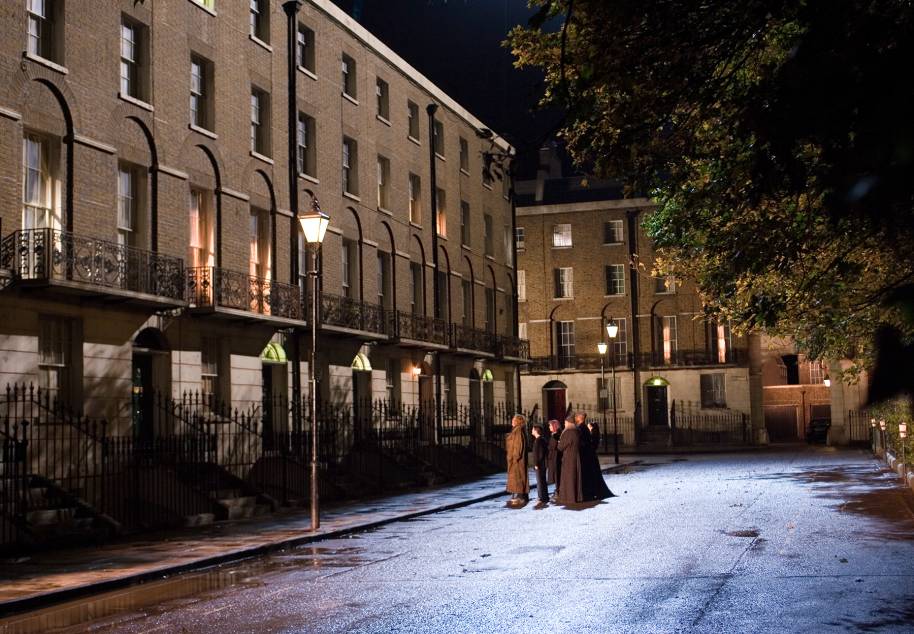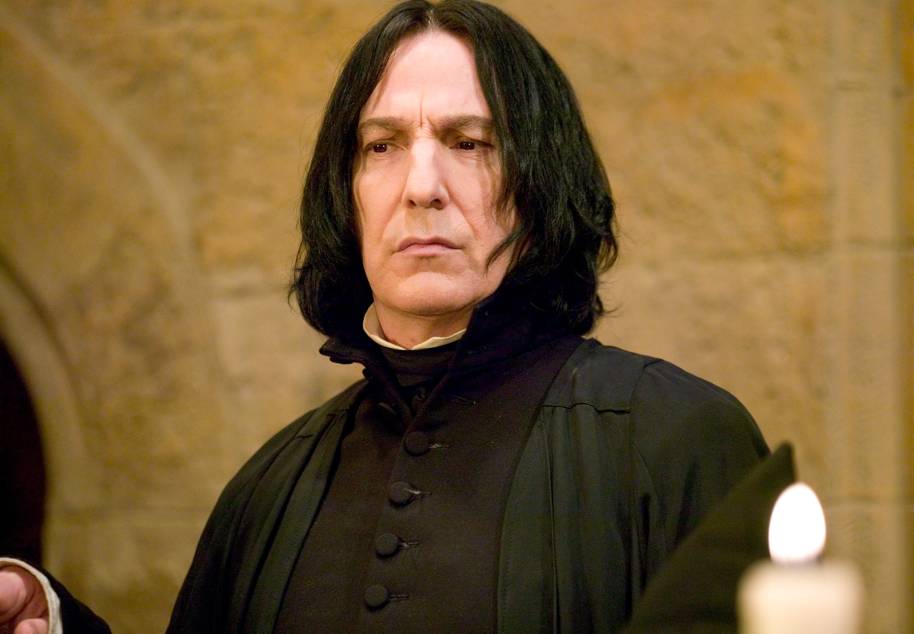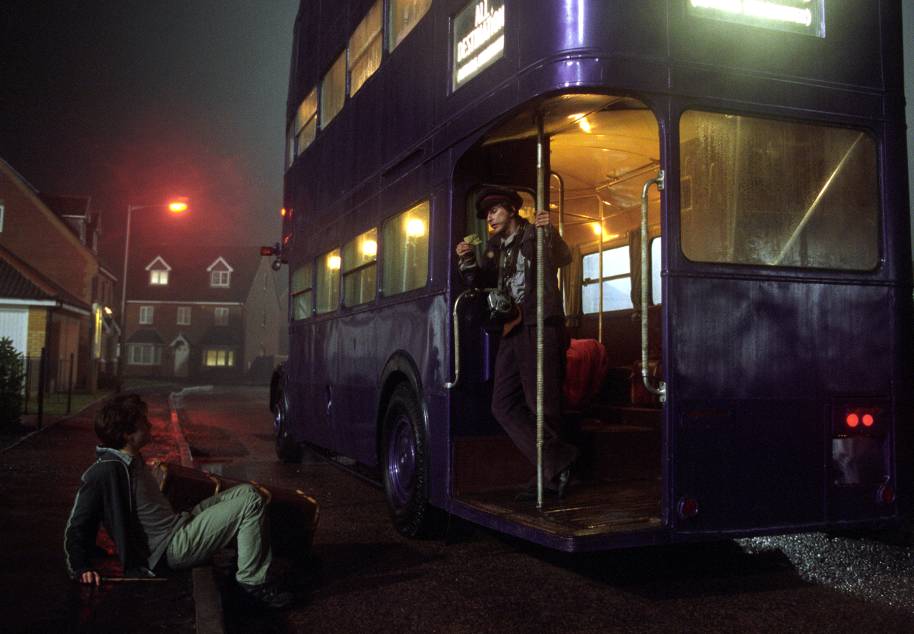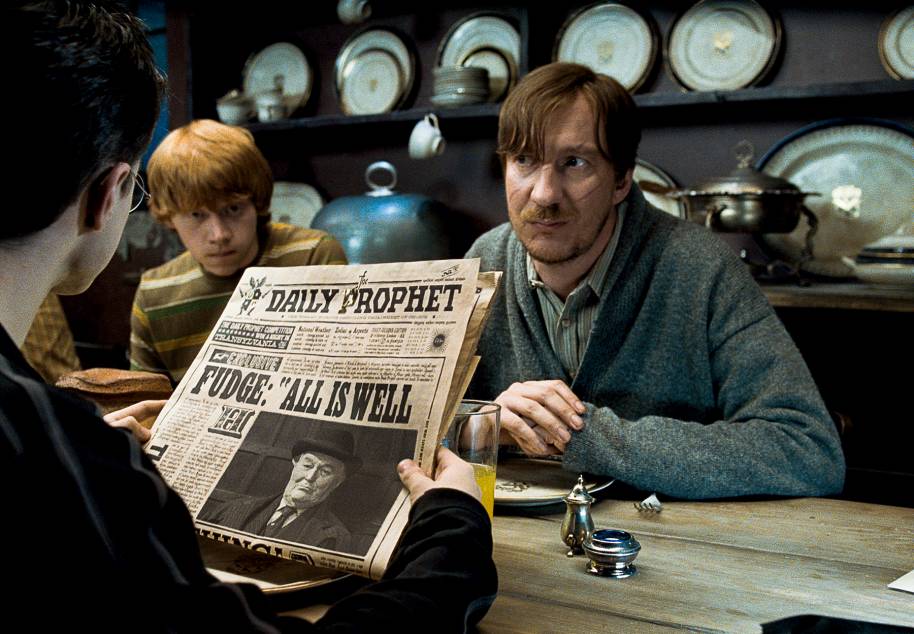1. Diagon Alley
Read the name of this very famous wizarding destination quickly… can you hear it? Diagon Alley is a play on the word diagonally! However, Harry soon found out the perils of these two words sounding so similar when he tried to travel to Diagon Alley using Floo Powder. Unfortunately, he ended up in an entirely different location which happens to be our next pun.
2. Knockturn Alley
Yep! Our next piece of wording wizardry references the seedy street next to Diagon Alley, Knockturn Alley. As before, run the first word into the second and you’ll see that it sounds just like nocturnally. And with Dark shops like Borgin and Burkes, random Death Eaters casually browsing creepy magical objects and general not-so-pleasant vibes, the word nocturnally certainly suits this shady street.
3. Grimmauld Place
Number twelve, Grimmauld Place was dark, dank and dusty. Filled with gruesome relics, you could hardly call ‘The Noble and Most Ancient House of Black’ cosy (despite Molly Weasley’s best efforts). We would even be tempted to call it a ‘grim old place’ – just like the name suggests!

4. Riddikulus
Imagine Snape dressed in the clothes of Neville’s grandmother – hat topped with a stuffed vulture and all. Just Riddikulus… sorry, we mean ridiculous, right? And there’s our next play on words... To banish a Boggart, you need to turn your worst nightmare into something ridiculous using this incantation, turning your fear into mirth. We reckon we might be able to guess what inspired its name!
5. Avada Kedavra
The Killing Curse might be the most heinous spell in the wizarding world, but have you noticed that it sounds just like the more innocent Abracadabra? This incantation favoured by Muggle magicians has been around for centuries and is usually used quite generally for any sort of magical trick or illusion. In an interview in 2004, J.K. Rowling explained that this term comes from the ancient language Aramaic, and she reinterpreted the phrase for one of her most famous spells.
6. Dolores Umbridge
A true villain with a supremely narrow mind, Dolores Umbridge would often take offence or be annoyed at every little thing… you could say she often took umbrage. Oh look, that sounds just like her name!
In this image:
7. Spellotape
Even the tiniest details and everyday wizarding items often involve some secret wit. Take Spellotape, which sounds like a very famous British brand of tape… Sellotape! Need we say more? Other tape brands are, of course, available.
8. Professor Sinistra
We might not have seen much of Professor Sinistra, but her name is rather intriguing. Not only does Sinistra sound like sinister (though whether this Hogwarts teacher was a disturbing presence, we just don’t know) but did you know that ‘sinistra’ is also the Italian for left hand? And (we might be making a leap here) isn’t it interesting that the teacher of Astronomy has a name rooted in Italian, when one of the most famous astronomers in history was Galileo, happened to be Italian?
9. Severus
The surly Potions Master could be quite stern or severe as his first name suggests. If you were to explore further, you’d find that Snape’s first name has its roots in Latin and means ‘harsh’ or ‘stern’. Well, doesn’t that suit his personality perfectly?

10. Pensieve
The Pensieve is a play on two words. Firstly, the word pensive, which means reflective or deeply thoughtful – appropriate for an object that shows and stores memories. Secondly, the word sieve. According to J.K. Rowling, this is ‘alluding to the object’s function of sorting meanings from a mass of thoughts or memories’.
11. Sirius Black
Sirius might sound like ‘serious’ but that’s not the answer to this particular piece of wordplay (especially as Harry’s roguish and mischievous godfather was anything but solemn). For this one we need to dig a little deeper. Did you know that Sirius is also a star? In fact, it is the Dog Star which sits within the ‘Great Dog’ constellation – rather fitting for an Animagus whose form is a black dog!
12. The Knight Bus
This is another interesting one. According to J.K. Rowling, the Knight Bus was named for two punny reasons. The first, knight is a homonym of night. In Britain, there are night buses that continue to run when normal public transport stops – a bit like a knight in shining armour rescuing those who are stranded. This also happens to be the second meaning behind the name ‘Knight Bus’. It too rides to the rescue of a stranded witch or wizard!

13. Mirror or Erised
This is another which is a bit of a thinker. Read the word ‘Erised’ backwards and you’ll see why we have included it. Yes! ‘Erised’ backwards is ‘desire’ (the mirror image if you will). And ‘desire’ sums this mirror up perfectly. When you gaze into its depths – it reflects your deepest dreams and what your heart longs for. The longer inscription across the frame of the mirror is also a full backwards message: 'Erised stra ehru oyt ube cafru oyt on wohsi' becomes 'I show not your face, but your heart’s desire.'
14. Kreacher
Rather straightforward, this one. The once inhospitable house-elf that dwelled in Grimmauld place was called Kreacher and that sounds like… creature! Simple, yet effective.
15. Remus Lupin
Finally, we have Remus Lupin. Every part of his name means wolf. In Roman mythology, Remus was one of two brothers (the other being Romulus) who were raised by wolves. The name Lupin (or lupine) is rooted in Latin and means wolf. Finally, even his father’s name reflects Remus’ ‘furry little problem’. Lyall has Norse origins and, weirdly, means fluorescent bouncing unicorn!… just kidding, it also means wolf.


